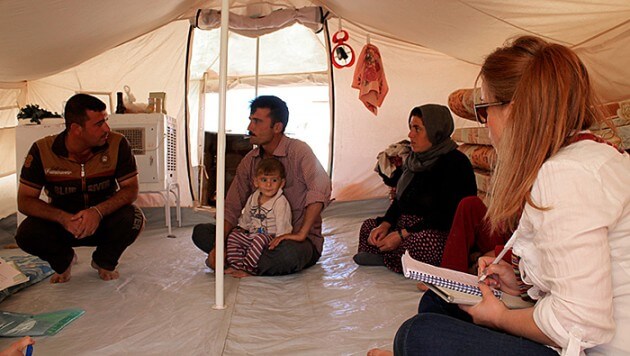
Iraqi Kurdish women’s magazine breaks with tradition, seeks to inspire
By Maria Sveistrup, IMS Communications Assistant
“People are tired of only hearing about the miserable parts of women’s lives. They want to read about those who succeed.”
Ala Lattif is 32 years old, holds a Master’s degree in journalism, and works as the editor of the Iraqi Kurdistan women’s magazine Zhin. Standing as an inspiration not only for other female journalists but women more generally in the region, she challenges the traditional norms around journalism and gender roles.
Going by the sparsely but trendily furnished newsroom in which she works, Ala Lattif could be anywhere between Paris and New York. Actually she sits only a few hundred kilometres away from areas controlled by Islamic State (IS) in Iraqi Kurdistan.
Her magazine Zhin (Kurdish for ‘woman’) was first published in February 2015, alongside an online version in Arabic. It employs an all-female staff who produce stories ranging from the female fighters who battle against Islamic State to the latest trends in fashion.
“When I chose to become a journalist, I wanted to work for the women in my society. People say that journalism is a man’s job, because men can do everything. We’ve been taught to think that female journalists can’t,” says Ala Lattif.
Female fight for freedom
Entrenched gender inequality, violence against women and even the killing of women in their own homes by partners or relatives are still quite common in Iraqi Kurdistan.
“Those things are all part of the reason why this magazine is so important,” says IMS’ Brigitte Sins. She has followed the process of establishing the magazine from the very beginning, working closely with its Iraqi Kurdish staff members.
“The female journalists are very proud of their nationality and identity. They are extremely strong and engaged in their work for the magazine.
“The women fight for freedom and development, while simultaneously standing by more traditional cultural values. For example, they really love their Kurdish music.”
The process of establishing the magazine began in 2013. When staff had to be hired, some women would show up for the job interviews with their father, uncle or brother, not being allowed to travel by themselves.
“This job requires that you are able to move around without a man watching your every step. Therefore, we could not hire them,” says Brigitte Sins.
Escaping Islamic State
In addition to promoting female success stories, Zhin portrays the devastating reality many women in the area face as a result of Islamic State’s advance in Iraq and Syria. In its first edition, the magazine presented a story on women who had escaped from IS captivity. Ala Lattif visited a refugee camp where some women who had managed to escape were now living.
“It was very difficult for me to cover this story,” she says. “These women are treated like everyone else in the camps despite their horrible experiences. They live in tents in bad conditions and will never be able to forget what happened to them.”
Ala Lattif explains that the women are haunted by their experiences. They cannot sleep and the mere sight of the colour black reminds them of Islamic State.
“Even if it is just someone wearing a black shirt, their minds take them back to their horrible experiences they suffered at the hands of IS,” she says. “Their stories are incredibly important and we need to let the world know about the awful time they are going through after their escape.”

Local support
ZHIN has been received well by its Iraqi Kurdish audience. The support has to do with certain bold editorial choices, including some that run counter to traditional religious values in a male-dominated society, such as presenting items like erotic underwear.
Several male journalists have expressed their interest in writing for the magazine.
“I tell them that to write about women, you have to think like a woman. A man would not have been able to make the female IS victims open up the same way Ala Latiff did,” says Brigitte Sins.
“The expectations women have to live up to are not known by men. They cannot understand the pressure and possible consequences of women’s actions.”
At the same time, she is thankful for the male support.
“The key is that you want to reach out to people that you want to influence. This includes both men and women.”
Differentiating themselves from other media outlets, Zhin is not controlled by any political party or otherwise under outside editorial pressure. The magazine’s emphasis is on high quality content and professionalism; characteristics that are not particularly common in the Iraqi media. This attracts more advertisers., says Brigitte Sins.
“By promoting success stories, we show women that it is not impossible to succeed and live a better life. People want to read about women who are happy,” she continues.
As a magazine that breaks with tradition, Zhin has met certain challenges regarding distribution and in reaching its target audiences. The magazine is not able to follow the regular distribution process through kiosks in the streets.
“Normally, there are more men than women walking around in the streets.” Zhin has been successful by going through universities and women’s groups to distribute the magazine. “We have a young promotion team that knows the popular places for modern women to hang out,” Brigitte Sins says.
The Kurdish team on the Zhin magazine believe that they have started a small revolution in Iraqi Kurdistan. “People have come congratulate us and want to share their stories with us. We believe that a magazine does not make sense unless it is embedded in society.”
Zhin is supported by International Media Support (IMS) as part of our work to promote independent, professional journalism in Iraq and Iraqi Kurdistan and to provide a platform for expression for women in a society where representation in, and production of, media is otherwise dominated almost entirely by men.




